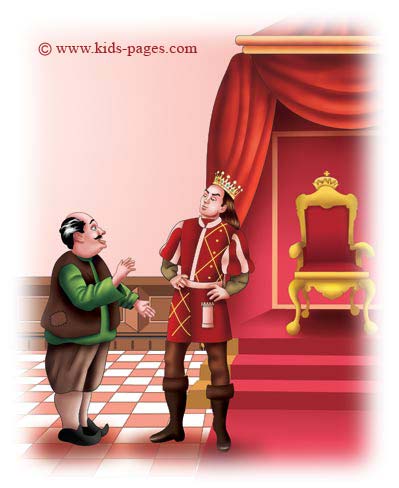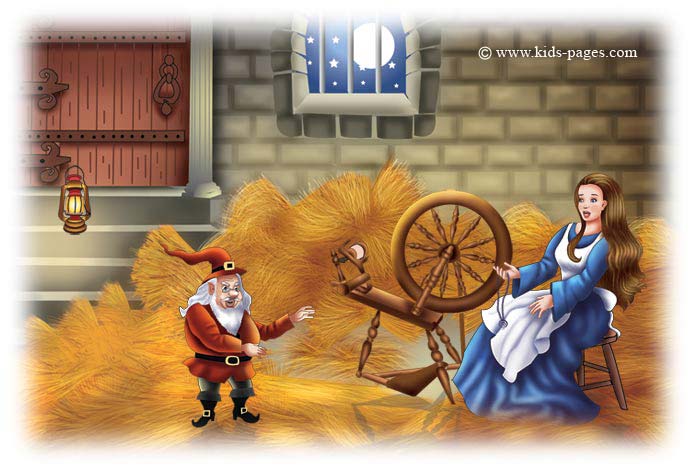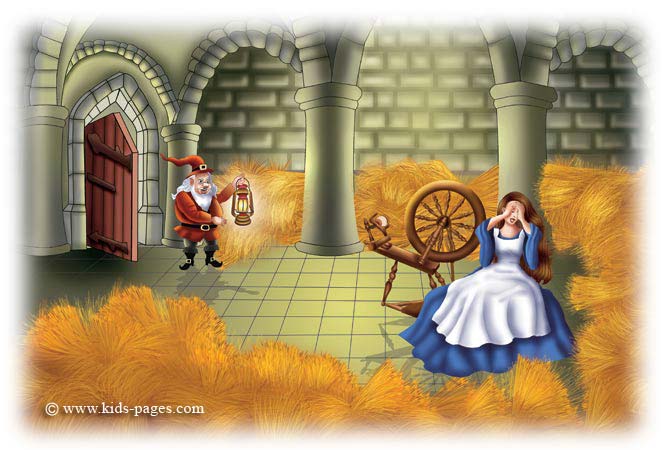Rumpelstiltskin Level 1 Once there was a very poor miller, who could not even pay his taxes to the kingdom. Because of this, the king ordered that he should be sent to prison. The miller was afraid, so he tried to trick the king:
Once there was a very poor miller, who could not even pay his taxes to the kingdom. Because of this, the king ordered that he should be sent to prison. The miller was afraid, so he tried to trick the king:
“Forgive me,” he beseeched, “and I will give you my daughter who can spin straw into gold.”
”Then bring her to me and I will forgive you,” the king said. The miller was very sorry for what he said, but it was too late. That night, the king took the miller’s daughter into a room filled with straw.
The miller was very sorry for what he said, but it was too late. That night, the king took the miller’s daughter into a room filled with straw.
“You must spin the straw into gold by morning,” he said, “or you and your father will be sent to prison.”
Then he locked the door. But the poor girl had no idea how she was supposed to do that.
She strove hard, but nothing happened. Then, she began to weep bitterly.Suddenly, the door opened and a strange little man entered.“Good evening, mistress miller. Why are you so sad?”“The king ordered me to spin the straw into gold,” she sobbed.“I can help you, but you must give me something in return.””Here’s my necklace,” she said. In response, the dwarf grabbed it in an instant.The little man sat down at the spinning wheel and, as soon as he started to spin it, the reel was filled with gold. And he did so the whole night till he finished spinning all the straw. By morning, the room was full of glittering gold. The king was so amazed to see all that gold that sparkled and shined incredibly!
 But the king became greedier and took the girl into a bigger room, with more straw than before and ordered her to spin all of it into gold.
But the king became greedier and took the girl into a bigger room, with more straw than before and ordered her to spin all of it into gold.
The little man came to her rescue again. This time, the girl offered him her golden ring, which was a gift from her mother.
The king’s greed grew again, though he tried to fight it, feeling compassion for the girl. But he locked her, anyway, for the third time into a tower filled with straw and made a promise to her:
“If you can spin all this straw into gold by morning, I promise to marry you,” he said.
Once again, the little man came in, but this time, the girl had nothing left to offer him.
“Then you must give me your first born child after you get married,” he said.
The girl agreed, desperate as she was, though she promised herself never to do that.
The next day, the king was very happy to see so much gold again. At the same time, he was touched by the girl’s patience and endurance. He felt his greed melting away and love blooming instead.
The king asked the girl for forgiveness, then, he kept his promise and married the miller’s daughter and made her his queen.
A year later, the queen gave birth to a child. She had completely forgotten about the little man. But one day, he came into her room again.
“I have come to take what you promised me, remember?” he said.
The queen offered him all the riches in the world, hoping she could keep her baby, but he just wouldn’t hear.
“Something alive is more precious to me than all the riches of this world,” he said.
Then, the little man proposed her a strange game:
“I give you three days to guess my name. If you guess, you can keep your baby.”
The queen spent the whole night making a long list with all the names she had ever heard.
The next day, she read all the names to the little man, but she didn’t guess.
Then, the queen sent messengers to search for names throughout the kingdom. Even so, she could not guess the little man’s name.
The third day, the queen lost all hope. She sent her messengers again to search for names.
When she least expected, the last messenger returned with a strange story.
“I was just passing through the forest, when I saw a funny little man dancing around a big fire,” he told the queen. “He was singing:
‘The queen is never going to win,
For my name is Rumpelstiltskin.’”
That night, at first, the queen played a little with the dwarf:
“Is your name Scattin?”
“No, this is not my name,” he answered.
“Then, is it Ierarhlon?”
“No, it’s not this either.”
“Could it be Rumpelstiltskin?” she finally asked, smiling.
On hearing this, the little man became so angry, that he turned blue. And he stamped his feet so hard, that he made a hole into the floor. Rumpelstiltskin ran off ashamed and he was never seen again.
The king discovered a new treasure, more precious than gold: Love. He learned that family makes you the richest man on earth. So the king and the queen lived happily ever after together with their beautiful daughter.

“Forgive me,” he beseeched, “and I will give you my daughter who can spin straw into gold.”
”Then bring her to me and I will forgive you,” the king said.

“You must spin the straw into gold by morning,” he said, “or you and your father will be sent to prison.”
Then he locked the door. But the poor girl had no idea how she was supposed to do that.
 But the king became greedier and took the girl into a bigger room, with more straw than before and ordered her to spin all of it into gold.
But the king became greedier and took the girl into a bigger room, with more straw than before and ordered her to spin all of it into gold.The little man came to her rescue again. This time, the girl offered him her golden ring, which was a gift from her mother.
The king’s greed grew again, though he tried to fight it, feeling compassion for the girl.
“If you can spin all this straw into gold by morning,
Once again, the little man came in, but this time, the girl had nothing left to offer him.
“Then you must give me your first born child after you get married,” he said.
The girl agreed, desperate as she was, though she promised herself never to do that.
The next day, the king was very happy to see so much gold again.
The king asked the girl for forgiveness, then, he kept his promise and married the miller’s daughter and made her his queen.
A year later, the queen gave birth to a child.
“I have come to take what you promised me, remember?” he said.
The queen offered him all the riches in the world, hoping she could keep her baby, but he just wouldn’t hear.
“Something alive is more precious to me than all the riches of this world,”
Then, the little man proposed her a strange game:
“I give you three days to guess my name. If you guess, you can keep your baby.”
The next day, she read all the names to the little man, but she didn’t guess.
Then, the queen sent messengers to search for names throughout the kingdom. Even so, she could not guess the little man’s name.
The third day, the queen lost all hope. She sent her messengers again to search for names.
When she least expected, the last messenger returned with a strange story.
“I was just passing through the forest, when I saw a funny little man dancing around a big fire,” he told the queen. “He was singing:
‘The queen is never going to win,
For my name is Rumpelstiltskin.’”
That night, at first, the queen played a little with the dwarf:
“Is your name Scattin?”
“No, this is not my name,” he answered.
“Then, is it Ierarhlon?”
“No, it’s not this either.”
“Could it be Rumpelstiltskin?” she finally asked, smiling.
On hearing this, the little man became so angry, that he turned blue.
The king discovered a new treasure, more precious than gold: Love.

RUMELSTILTSKIN by Grimm Brothers Level 2
Once there was a miller who was poor, but who had a beautiful daughter.And when the girl was brought to him he took her into a room which was quite full of straw, gave her a spinning-wheel and a reel, and said, "Now set to work, and if by to-morrow morning early you have not spun this straw into gold during the night, you must die."
But all at once the door opened, and in came a little man, and said,
The King rejoiced beyond measure at the sight, but still he had not gold enough; and he had the miller's daughter taken into a still larger room full of straw, and said, "You must spin this, too, in the course of this night; but if you succeed, you shall be my wife." "Even if she be a miller's daughter," thought he, "I could not find a richer wife in the whole world."
When the girl was alone the manikin came again for the third time, and said, "What will you give me if I spin the straw for you this time also?" "I have nothing left that I could give," answered the girl. "Then promise me, if you should become Queen, your first child." "Who knows whether that will ever happen?" thought the miller's daughter; and, not knowing how else to help herself in this strait, she promised the manikin what he wanted, and for that he once more span the straw into gold.
And when the King came in the morning, and found all as he had wished, he took her in marriage, and the pretty miller's daughter became a Queen.
A year after, she had a beautiful child, and she never gave a thought to the manikin. But suddenly he came into her room, and said, "Now give me what you promised." The Queen was horror-struck, and offered the manikin all the riches of the kingdom if he would leave her the child. But the manikin said, "No, something that is living is dearer to me than all the treasures in the world." Then the Queen began to weep and cry, so that the manikin pitied her. "I will give you three days' time," said he, "if by that time you find out my name, then shall you keep your child."
So the Queen thought the whole night of all the names that she had ever heard, and she sent a messenger over the country to inquire, far and wide, for any other names that there might be. When the manikin came the next day, she began with Caspar, Melchior, Balthazar, and said all the names she knew, one after another; but to every one the little man said, "That is not my name." On the second day she had inquiries made in the neighborhood as to the names of the people there, and she repeated to the manikin the most uncommon and curious. "Perhaps your name is Shortribs, or Sheepshanks, or Laceleg?" but he always answered,
On the third day the messenger came back again, and said, "I have not been able to find a single new name, but as I came to a high mountain at the end of the forest, where the fox and the hare bid each other good night, there I saw a little house, and before the house a fire was burning, and round about the fire quite
"To-day I bake, to-morrow brew,
The next I'll have the young Queen's child.
Ha! glad am I that no one knew
That Rumpelstiltskin I am styled."
You may think how glad the Queen was when she heard the name! And when soon afterwards the little man came in, and asked, "Now, Mistress Queen, what is my name?" at first she said, "Is your name Conrad?" "No." "Is your name Harry?" "No."
"Perhaps your name is Rumpelstiltskin?"
"The devil has told you that! the devil has told you that!" cried the little man,
Byl jednou jeden chudý mlynář, který měl krásnou dceru. I jednou se mu přihodilo, že se dostal do řeči s králem a řekl: „To já mám dceru, která umí spříst slámu na zlato!“ Králi, který se měl ke zlatu, jak se má hrdlička k hrdličce, se tohle umění zamlouvalo, a tak si poručil, aby k němu mlynářova dcera co nejrychleji přišla. Pak ji zavedl do komnaty, která byla plná slámy, přistrčil jí kolovrátek i s vřeténkem a řekl: „Pokud přes noc nespředeš všechnu slámu na zlato, zemřeš!“ A bylo to! Pak zamknul dveře a šel pryč.
V dívce by se jeden krve nedořezal. Kdo to kdy viděl spřádat slámu na zlato? S úlekem přišel i strach, a tak tam ve třech seděli na slámě a samou bezradností jim tekly slzy po tvářích. Do toho naříkání se pojednou otevřely dveře, dovnitř vešel pidimužíček a řekl: „Dobrý večer, panno mlynářko, pročpak tak usedavě pláčeš?“ „Ach,“ povzdychla si: „mám spříst slámu na zlato, ale neumím to.“ Tu mužíček řekl: „A co mi dáš, když ti to spředu?“ „Tady ty korálky.“ odvětila. Mužík si je vzal, posadil se ke kolovrátku, třikrát sešlápnul a třikrát zatočil; a tu máš čerte kropenku! špulka byla plná zlaté nitě! Popadnul další špulku, měl se opět ke trojímu šlápnutí a trojímu máchnutí a i druhá špulka byla plná. A tak to šlo až do rána, kdy byla všechna sláma spředená a špulky plné zlatých nití. Však také králi, když přišel, poskočilo srdce radostí, ale protože s jídlem roste chuť a kdo má hrnec, chce i poklici, zavedl dívku do jiné, ještě větší komnaty plné slámy, aby ji v noci zase spředla, pokud je jí život milý. A bylo to!
K úleku i strachu si přisedla panika a bylo zase slz a nářku, až to přilákalo toho pidimužíčka, který se nabídnul k pomoci, ale musela mu za to dát svůj prstýnek. Do ranního kuropění byla práce hotova, z čehož byl král opět nadšený, ale chtivost mu seděla pevně v zátylku. Zavedl dívku tentokrát do opravdu obrovské komnaty naplněné slámou a řekl: „Musíš příst ještě tuhle noc, když to dokážeš, staneš se mojí ženou.“ To bylo od toho krále chytré, kde by také sehnal bohatší ženu než ta, co umí slámu spříst na zlato.
Tentokrát nemusela přivolávat pidimužíka slzami a nářkem, jen co za králem zaklapl zámek, byl tu: „Copak mi dáš, když ti i tentokrát slámu spředu?“ „Už nemám nic, co bych ti mohla dát!“ řekla smutně. „Tak mi slib, že až se staneš královnou, dáš mi své první dítě.“ „Inu, kdo ví, jak to vše bude.“ pomyslela si dívka, neboť královské sliby mívají dlouhé nohy a utekou dřív, než by se jeden ohlédnul. Stejně si z té šlamastyky jinak pomoci neuměla, a tak mužíkovi slíbila, co si přál. K jejímu velkému překvapení však král, když ráno přišel a našel vše, jak jsi přál, nechal hned vystrojit svatbu a ona se stala opravdu královnou.
A běžel čas, jak bývá jeho zvykem, neúprosně a bez ustání.
Sešel se rok s rokem a královna povila krásné dítě. Na pidimužíka dávno zapomněla, když tu se jednoho rána objevil v její komnatě a řekl: „Nyní mi dej, co jsi slíbila.“ Královna se velmi polekala a nabízela mužíkovi všechny poklady říše, jen když jí dítě ponechá, ale ten pravil: „Ne, ne! To dítě je mi milejší než všechny poklady světa.“ A tak to královna zkusila zase se slzami a nářkem, až k ní mužík pojal lítost a řekl: „Dám ti tři dny na přemýšlení, když v té lhůtě uhodneš moje jméno, můžeš si dítě ponechat.“ A tak královna celou noc přemýšlela nad všemi jmény, která kdy slyšela, a k tomu vyslala jednoho posla, aby se po celé jejich říši pídil po nových jménech.
Když se pidimužík druhého dne objevil, královna to na něj zkusila s Kašparem, Melicharem a Baltazarem a pak vypověděla všechna jména, která znala, ale u každého mužík prohlásil: „Tak se nejmenuji!“ Druhého dne se královna vyptávala všech lidí kolem a pak pro mužíčka měla nej neobyčejnější a nejpodivuhodnější jména jako Žebrovníček, Hrdonožka a Skopeček, ale ten trval na svém: „Tak se nejmenuji!“ Třetího dne se vrátil posel a vyprávěl: „Nové jméno nemám žádné, ale když jsem dorazil na jednu vysokou horu, našel jsem tam chaloupku, před kterou hořel ohníček a kolem poskakoval a výskal mužíček a k tomu si prozpěvoval: „Peču chleba, pivo vařím, na zámku mě čekají, jen ohníčku se svěřím, že mně Rumpelník říkají!“ Královně spadl kámen ze srdce! To vám byla rána!
Když se mužíček objevil do třetice, řekl: „Nu, paní královno, jak se jmenuji?“ Královna odvětila: „Jmenuješ se Kuneš?“ „Tak se nejmenuji!“ „Jsi tedy Honza?“ „Tak se taky nejmenuji!“ „A co tedy Rumpelník?“ „To ti ďábel našeptal! To ti ďábel našeptal!“ křičel mužíček celý zlostí bez sebe. A jak se v něm ta zlost vařila, dupnul si pravou nohou tak vztekle, až se pod ním prolomila podlaha a on uvíznul ve škvíře. To mu bylo k ještě většímu vzteku, tak se oběma rukama popadnul a roztrhnul vedví.











